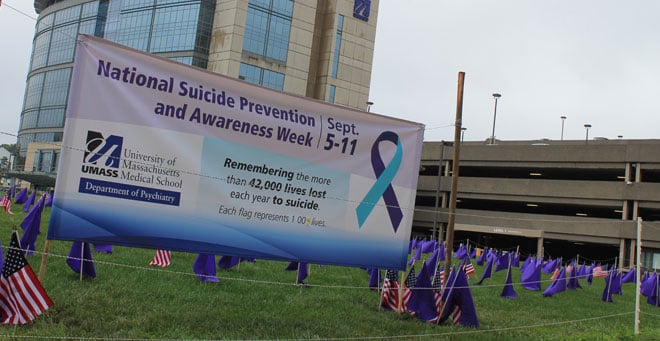 |
|
|
Four hundred flags representing the more than 40,000 deaths from suicide annually in the United States were raised at UMass Medical School. |
A campus-wide event to raise awareness and provide education about suicide prevention took place at UMass Medical School on Wednesday, Sept. 7. Heralding the observance was a display of 400 flags representing the more than 40,000 deaths from suicide that occur annually in the United States. Sixty are American flags representing military suicides and the rest are purple which, along with turquoise, represent suicide and survivors of suicide.
The event to mark National Suicide Prevention and Awareness Week and World Suicide Prevention Day was organized by UMMS community member Kye Flotte and Barry Feldman, PhD, assistant professor of psychiatry and director of Psychiatry Programs in Public Safety.
“Our goal is no less than the transformation of how we identify and address suicide risk, regardless of where a patient enters the health care system,” said Edwin Boudreaux, PhD, professor of emergency medicine, psychiatry and quantitative health sciences and vice chair of research for the Department of Emergency Medicine. Dr. Boudreaux and Catarina Kiefe, PhD, MD, chair and professor of quantitative health sciences, recently received a five-year grant from the National Institute of Mental Health to implement, with UMass Memorial Health Care, the System of Safety (SOS) for suicide prevention, modeled on the national Zero Suicide initiative.
During a brief speaking program, Luanne Thorndyke, MD, shared her own encounters with suicide, which include a colleague and her son’s death by suicide four years ago. “These experiences have led me to believe and be passionate about the concept that suicides are preventable,” said Dr. Thorndyke, vice provost for faculty affairs and professor of medicine. “While we may never be able to prevent all deaths by suicide, I do believe we can do a better job than we are now.”
Thorndyke closed on a grateful and hopeful note. “I am so proud that UMass Medical School has taken the lead in the Zero Suicide prevention movement, and will be implementing tools, actions and processes to get as close as we can to our goal of zero suicide.”
Ongoing suicide prevention initiatives at UMMS include a collaboration with the Massachusetts National Guard and Massachusetts Department of Veterans Services to implement suicide prevention strategies specifically designed for military personnel, and the Emergency Department Safety Assessment and Follow-up Evaluation (ED-SAFE) study, led by Boudreaux. The goal of ED-SAFE is to develop evidence-based practice guidelines that will optimize the emergency department as an important setting in which to increase suicide risk detection and suicide prevention.
Related links on UMassMedNow:
Barry Feldman explains teen suicide risk factors
Expert’s Corner: Facing the facts on youth suicide
Suicide risk can be intercepted in the emergency department, UMMS study finds
Collaboration announced to help prevent military suicide
$12 million suicide-prevention study targets patients in the emergency room